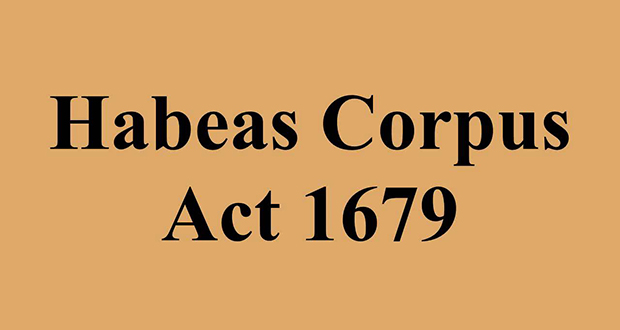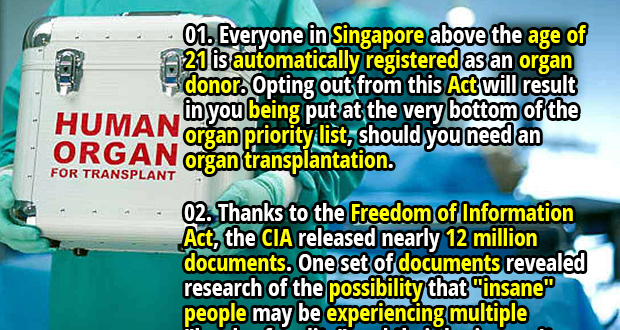1Organ transplantation

Everyone in Singapore above the age of 21 is automatically registered as an organ donor. Opting out from this Act will result in you being put at the very bottom of the organ priority list, should you need an organ transplantation.
2. Jackie Coogan was a child actor in the silent film era who earned millions of dollars from his acting, only to find out in his 20s that his parents had spent it all on jewelry and cars. He sued them and the litigation resulted in the passage of the Coogan Act, which protects child actors.
3. Canada has the "Apology Act", whereby apologizing to someone after an incident can't be used in court to establish guilt or liability of the person apologizing.
4. Thanks to the National Labor Relations Act, an employer cannot prohibit their employees from discussing their salary or wage levels with one another.
5. Police in the UK can legally break into any person's house under the Bees Act 1980 if they suspect it contains foreign bees.
Latest FactRepublic Video:
15 Most Controversial & Costly Blunders in History
6Habeas Corpus Act

When the Act of Habeas Corpus 1679 was to be passed, the votes were counted and when there were not enough Lords in favor, it was decided that one of the Lords was worth ten votes because he happened to be fat. It started as a joke but remains on the statute books to this day.
7. Canada has an act called ‘The Good Samaritan Drug Overdose Act’ that remove barriers to those involved in an overdose. In the event that you need to call 911 for someone who is overdosed, you won’t get arrested for possession of controlled substances charges, and breach of conditions regarding the drug charge.
8. During World War 2 there were around more than 250,000 Filipino soldiers that fought for the allied forces and were promised the same compensation as their American counterparts, but in 1946 Truman signed the Rescission Act of 1946 which denied Filipino soldiers all of their benefits.
9. In the New Deal, Franklin D. Roosevelt called for a new tax program called the Revenue Act of 1935, which imposed an income tax of 79% on incomes over $5 million. This tax rate affected literally one person: John D. Rockefeller.
10. During a speech to senators intended to convince them that the dust bowl epidemic was a real issue, a massive dust cloud enveloped Washington D.C., blackening the windows of the hearing and caking the room with dust. The Soil Conservation Act was passed later that year.
11Onion Futures Act

Onions are the only commodity banned from futures trading in the United States. The Onion Futures Act was passed in 1958 after two traders cornered the onion market in Chicago controlling 98% of all available onions.
12. The National School Lunch Act of 1946 was passed, in part, because of the number of draftees that were rejected during World War 2 due to being malnourished.
13. Disney successfully lobbied Congress to extend the length of copyright protection in order to prevent Mickey Mouse from entering the public domain. The law was later referred to as the Mickey Mouse Protection Act.
14. Thanks to the Freedom of Information Act, the CIA released nearly 12 million documents. One set of documents revealed research of the possibility that "insane" people may be experiencing multiple "levels of reality" and their brains can't process this information, leading to mental instability.
15. In 1996, a bill called the Bill Emerson Good Samaritan Act was passed to protect food vendors from liability for giving unused food to the needy instead of throwing it away for liability reasons.
16Civil Liberties Act

In 1988, President Reagan signed the Civil Liberties Act, which gave $20,000 reparations to every Japanese-American (and their descendants) who got sent to internment camps in World War 2.
17. Up to the early 1970s, credit cards were reserved for men. Women could get a credit card if their husbands cosigned on the application. The Equal Credit Opportunity Act (1974) made it unlawful to discriminate on the basis of race, color, religion, national origin, sex, or marital status.
18. One of the categories included in the Mental Deficiency Act 1913 was “moral imbecile.” This could include women who repeatedly had children out of wedlock and could therefore be institutionalized. It was repealed in 1959.
19. The NFL doesn't play on Friday and Saturday because the 1961 Sports Broadcasting Act prohibits them from doing so to protect fans of college and high school football.
20. Refrigerators have magnetic strips so that they are easy to open from both the inside and outside. In 1956, the Refrigerator Safety Act was passed to protect kids that would die inside abandoned refrigerators while playing around.
21Hague Invasion Act

The American Service-Members’ Protection Act, nicknamed the “Hague Invasion Act” which was passed in 2002 instructs the US military to use any means necessary to free US officials imprisoned for war crimes by the International Criminal Court.
22. There is no federal minimum drinking age law. It doesn't have that authority. An act signed by Reagan, however, supersedes the states’ rights by punishing any state that ignores this by reducing federal highway apportionment by 10% in an effort to reduce drunk driving.
23. It is illegal to swear in public in some parts of Australia. The Summary Offenses Act 1988 states, “a person must not use offensive language in or near, or within hearing from, a public place or school.” Punishment can include fines or jail.
24. The last time the number of Justices on the US Supreme court was changed, was in 1869 because of the Judiciary Act of 1869 which set the court to 9 justices, which has been the number of justices ever since.
25. In 1856, the U.S. passed the Guano Islands Act, which allowed its citizens to temporarily possess any unclaimed islands to mine their guano deposits.




